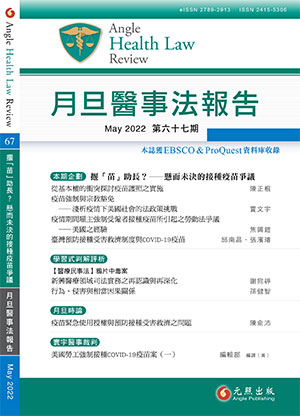疫情期間雇主強制受僱者接種疫苗所引起之勞動法爭議──美國之經驗【本期企劃】 試閱
Labor Disputes Arising from Mandatory Vaccination in the Workplace During the Covid-19 Pandemic—Lessons from the United States
本文之目的希望檢視在新冠肺炎疫情期間,美國雇主強制受僱者接種疫苗所引起之勞動法爭議,諸如就業歧視、職業安全衛生及失業救濟等議題,並探討美國之經驗可否供我國參考攻錯。在私部門方面,該國勞資關係一向深受僱用自由意志原則之影響,雇主擁有極大之解僱權,兼以工會運動在近年之衰微,因此,雇主這種強勢作為雖曾遭到持反對意見者之抗拒,但阻力並不大;至於聯邦最高法院最近在Biden v. Missouri一案,所作不利大型企業雇主立場之判決,對僱用員工100人以下事業單位之雇主,並沒有任何之影響。在公部門方面,拜登總統透過頒布總統行政命令之方式,也使得軍方及公務員體系不得不全面遵循。從而,根據美國之經驗,我國雇主如希望在這方面採行強制之作為,所面臨之勞動法挑戰應不難克服。
The purpose of the paper is to examine labor law controversies arising from mandatory vaccination measures adopted by employers during the Covid-19 pandemic in the United States, such as employment discrimination, occupational safety and health, and payment of unemployment benefits. It also tries to learn whether American experiences can provide Taiwan with relevant policy guidance. Due to the fact that employers have traditionally enjoyed extensive managerial prerogatives in the workplace under the influence of employment-at-will doctrine in the private sector, along with the rapid decline of the labor movement in that country, they have been able to proceed with this mandatory measures with little opposition. Although the U.S. Supreme Court has blocked President Joseph R. Biden’s effort to vaccinate employees in private business entities with over 100 employees in Biden v. Missouri, the ruling has almost no impact on small and medium enterprises. Also, since President Biden has much more leverage over federal employees in the public sector, mandatory vaccination measures are also easily implemented extensively in the military and government agencies. Therefore, judging from the American experience, this paper concludes that similar mandatory vaccination measures will encounter little legal challenges in Taiwan.
039-049






